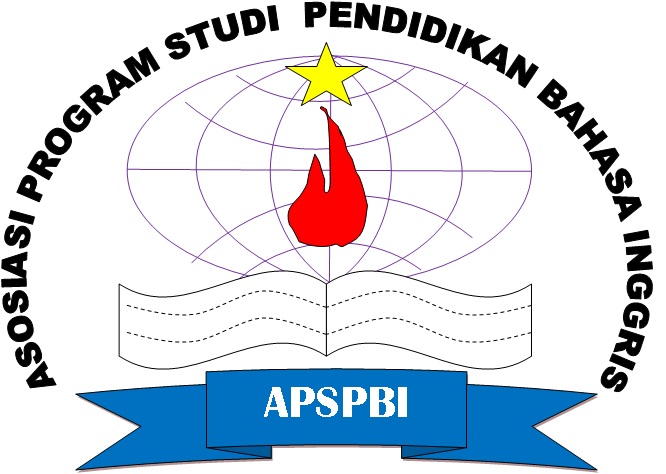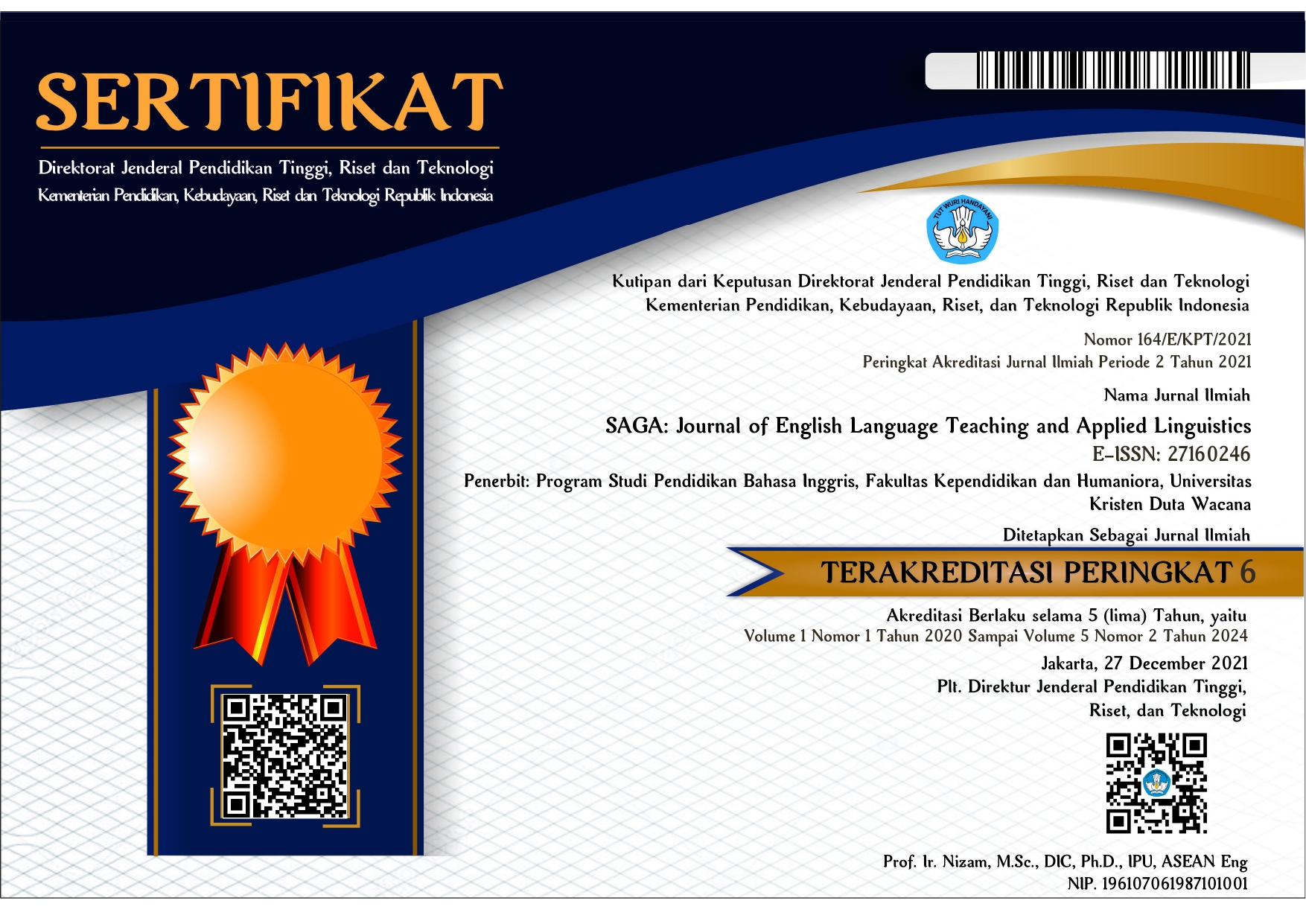Students’ Perspectives of Online Collaborative Learning in Professional Narrative Writing Course
DOI:
https://doi.org/10.21460/saga.2022.32.132Keywords:
students’ perspectives, online collaborative learning, Professional Narrative Writing courseAbstract
Writing becomes one of the complex processes in learning English. Students must consider many things to develop good writing, especially non-native English students in the Professional Narrative Writing course at Universitas Kristen Satya Wacana. Due to the COVID-19 that was spreading in the world, Professional Narrative Writing students had to do online writing activities, one of them was doing online collaborative learning. Therefore, the aim of this study was to investigate the students’ perspectives of online collaborative learning in the Professional Narrative Writing course. Also, this study attempted to address one research question: What are the students’ perspectives of online collaborative learning in Professional Narrative Writing course?. The participants of this study were thirty-four students from three online Professional Narrative Writing course. This study used the qualitative method with thematic analysis. Then, the data were collected using open-ended and close-ended questionnaires and interviews. The results showed that all students did online collaborative learning in the Professional Narrative Writing course. They had positive and negative feelings during the online collaborative learning. Besides that, the students had different opinions on whether online collaborative learning was beneficial or difficult for them. Although students experienced difficulties in online collaborative learning, they could deal with them well. Afterward, the results indicated the number of students who preferred online collaborative learning was higher than individual work. Hopefully, this research was fruitful for the students to find out other students’ perspectives on online collaborative learning. Also, this research may help the lecturers to determine whether online collaborative learning was suitable for students or not.
References
Chiong, R., & Jovanovic, J. (2012). Collaborative learning in online study groups: An Evolutionary Game Theory perspective. Journal of Information Technology Education: Research, 11, 81-101.
Clavert, M. (2019). Industry 4.0 implications for higher education institutions [e-book]. Retrieved February 18, 2021, from https://universitiesofthefuture.eu/wp-content/uploads/2019/02/State-of-Maturity_Report.pdf
Covid19.go.id. (2021). Data sebaran. Retrieved February 18, 2021, from https://covid19.go.id/
Efriana, L. (2021). Problems of online learning during COVID-19 pandemic in EFL classroom and the solution. Journal of English Language Teaching and Literature, 2(1), 38–47.
Heng, Y.K., Linda, L., & Yi, C., C. (2004). Collaborative learning experiences in online instructional design courses. Annual Proceedings, 1, 513-521.
Khalil, Z. M. (2018). EFL students’ perceptions towards using Google Docs and Google Classroom as online collaborative tools in learning grammar. Applied Linguistics Research Journal, 2(2), 33-48.
Koh, M. H., & Hill, J. R. (2009). Student perceptions of groupwork in an online course: benefits and challenges. International Journal of E-Learning & Distance Education, 23(2), 69-92.
Laia, M. Y. (2019). The difficulties of students to write narrative text at the eighth grade students of SMP Negeri 1 Lolawu. Journal Education and Development, 7(1), 1- 125.
Maulidah, U.N., & Aziz, I.M. (2020). The effectiveness of online collaborative learning on student writing skill. EDUCATIO: Journal of Education, 5(2), 141-149.
Muuro, E. M., Wagacha, W. P., Oboko, R., & Kihoro, J. (2014). Students’ perceived challenges in an online collaborative learning environment: A case of higher learning institutions in Nairobi, Kenya. The International Review of Research in Open and Distance Learning, 15(6), 132-161.
Ozkara, B.O., & Cakir, H. (2020). Comparison of collaborative and individual learning in online learning. TOJET: The Turkish Online Journal of Educational Technology, 19(4), 66-74.
Professional Narrative Writing Online Syllabus (2020). English Language Education Program (ELEP), Universitas Kristen Satya Wacana, Salatiga, Indonesia.
Professional Narrative Writing Online Syllabus (2021). English Language Education Program (ELEP), Universitas Kristen Satya Wacana, Salatiga, Indonesia.
Rahayu, E. S. (2016). Using Google Docs on collaborative writing technique for teaching English to non-English department students. Proceedings of the Fourth International Seminar on English Language and Teaching, 4, 226-236.
Robinson, A. H., Kilgore, W., & Warren, J. S. (2017). Care, communication, learner support: Designing meaningful online collaborative learning. Online Learning Journal, 21(4), 29-51. Retrieved February 18, 2021, from https://files.eric.ed.gov/fulltext/EJ1163608.pdf
Silva, D. R. (2017, October 2). 18 motivational quotes to bring out the writer in you [Blog post]. Retrieved March 18, 2021, from https://writingcooperative.com/18-motivational-quotes-to-bring-out-the-writer-in-you-ea3e61c93734?gi=32122241cef1
Stoytcheva, M. (2018). Students’ perceptions of online collaboration in a distance learning French language course. AIP Conference Proceedings, 12, 1-9.
Yoandita, P. K. (2019). An analysis of students’ ability and difficulties in writing descriptive text. Jurnal JOEPALLT, 7(1), 1-14.
















